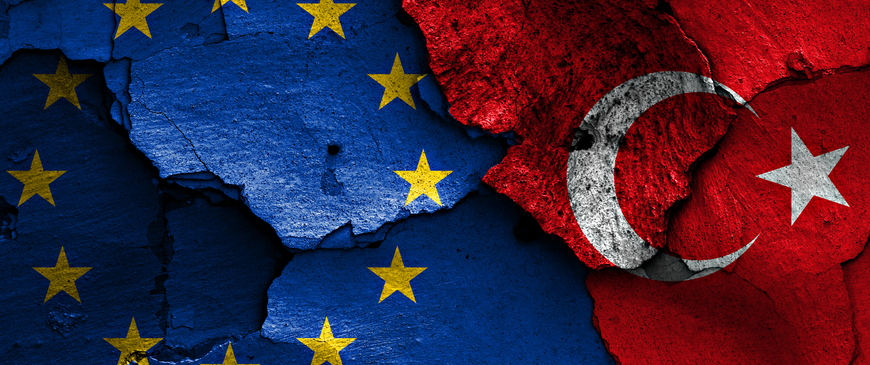
Can the EU and Turkey avoid more confrontation?
Tensions between Europe and Turkey are rising. The EU should forge a firm common stance with London and Washington, while keeping the door open for better relations.
EU-Turkey relations have been tense since the Turkish government’s crackdown on civil liberties in the wake of the failed August 2016 coup by elements of the Turkish armed forces. The relationship became markedly transactional, as the EU and Turkey focused on co-operating on preventing migrants from reaching the EU. But even transactional co-operation has become difficult. Disagreements are no longer confined to the deterioration of democracy in Turkey. Ankara has become increasingly assertive in advancing its interests in its neighbourhood, clashing directly with Cyprus, France, Greece and the US.
In June, there was a dangerous confrontation when a French naval vessel tried to inspect a cargo ship that it thought was violating the UN arms embargo on Libya, and was reportedly harassed by Turkish ships escorting it. In July, Turkey stated it intended to carry out a seismic survey near the Greek island of Kastellorizo, 2km from Turkey’s coast, prompting Greece to say it would deploy its military to defend its sovereignty. The situation was defused only after Germany hosted direct talks between Greece and Turkey. But Turkish President Recep Tayyip Erdoğan has said Turkey will continue energy exploration, meaning more dangerous incidents are possible.
Multiple sources of friction
Competing claims over maritime borders, partly fuelled by the recent discovery of large natural gas resources in the eastern Mediterranean, are the main source of friction between the EU and Turkey. Ankara argues that Cyprus has no right to exploit its gas resources until it reaches a deal to share them with Turkish Cypriots in the island’s north. Turkey, which is not a signatory to the UN Convention on the Law of the Sea (UNCLOS), contests the Greek and Cypriot declared Exclusive Economic Zones (EEZs), and claims a larger EEZ for itself.
When states disagree over delimiting their EEZs, they should try to reach a bilateral agreement. However, no talks are ongoing, and Turkey has tried to assert its claims by applying pressure to Greece and Cyprus. Ankara has repeatedly sent planes into Greek airspace and drawn up plans to drill near Greek islands, while saying that it is open to negotiating maritime boundaries with Greece. At the same time, Ankara has also sent ships into Cyprus’s declared EEZ since spring 2019, and hindered foreign ships from exploring for gas there. In November 2019, Ankara signed an agreement with the UN-backed Government of National Accord (GNA) in Libya, setting a maritime boundary between Turkey and Libya that does not take into account Crete, and therefore claims part of Greece’s declared EEZ.
The EU views Ankara’s actions as unacceptable. It argues that Cyprus is entitled to develop its gas reserves freely, and that any disputes over EEZs should be resolved through amicable negotiations, rather than under pressure. The EU rejected the maritime agreement between Turkey and Libya, and in February imposed sanctions on Turkish officials involved in exploration activities near Cyprus. However, sanctions have not led to a change in Turkish policy, with Ankara continuing its energy exploration activities in the Aegean and the eastern Mediterranean.
Turkey’s intervention in support of the UN-backed government in Libya earlier this year turned the tide of the conflict, forcing military commander Khalifa Haftar, who aims to overthrow the UN-backed government, to abandon his attack on Tripoli. At the same time, Turkey’s intervention damaged relations with many European countries, particularly France, which has backed Haftar. Other member-states, though not supporting Haftar, have nevertheless been concerned that Turkey’s intervention, after initially stabilising the situation, could prompt escalation of the conflict. Russia has increased its assistance to Haftar, and Egypt has threatened to intervene in his favour.
Turkey’s October 2019 military intervention in northern Syria has been another source of friction with Europe. Ankara’s operation aimed to remove the Kurdish YPG, which it sees as the Syrian branch of the PKK terrorist group, from the Syrian-Turkish border. The EU, which viewed the YPG as an important ally in the fight against the so-called Islamic State, strongly condemned Turkey’s offensive, and imposed a partial ban on future arms sales to Ankara, while stopping short of a full embargo.
Towards more sanctions?
Turkey’s policy in the Aegean, the eastern Mediterranean and Libya has only added to the EU’s concerns about the increasing authoritarianism of Turkey’s government domestically, and its broader foreign policy. Ankara’s actions in the Mediterranean are part of a push to establish Turkey as a major regional power with an autonomous foreign policy, wholly separate from that of the West. Ankara has embraced an expansive notion of national security, creating a buffer zone in Syria, establishing a foothold in Libya and maintaining bases in northern Iraq to fight the PKK. Ankara has also forged closer links to Russia, by co-operating in Syria, and purchasing a missile system from Moscow that led the US to removing Turkey from the F-35 fighter programme. The Turkish government’s assertive foreign policy is also part of an ambition to position Turkey as the leader of the Muslim World: it has supported the Muslim Brotherhood and championed the Palestinian cause.
While Turkey’s foreign policy has alarmed the EU, co-operation on migration has also become problematic. In 2016 the EU agreed to provide Turkey with €6 billion to help it support the four million refugees it is hosting. The money did not go directly to the Turkish government, but financed projects to help pay for refugees’ education, housing and healthcare. By the middle of 2020, just over half the money pledged in the deal had been disbursed, and Ankara pointed out that the EU had not fulfilled promises it had made as part of the 2016 agreement, such as reinvigorating Turkey’s EU accession talks or opening negotiations on modernising the EU-Turkey customs union. The EU is unwilling to move forward with these issues unless civil liberties in Turkey greatly improve. In late February 2020, the Turkish government encouraged thousands of migrants to try to cross into Greece, a move that the EU saw as an assault on the Greek border and an attempt to ‘weaponise’ migrants.
Ankara’s increasing assertiveness has led some member-states to advocate a tougher EU stance towards Turkey.
Ankara’s increasing assertiveness has led some member-states to advocate a tougher EU stance towards Turkey. France in particular has called for sanctions and has hinted that Ankara’s accession bid to the EU should be terminated. Paris’ call for sanctions is backed by Cyprus and Greece. While other member-states also see Turkey’s actions as problematic, they tend to favour a milder approach. First, sanctions on Turkey would primarily hurt Turkey’s economy (which is already in freefall), but would also hurt European businesses. Second, Turkey’s government could potentially respond by pushing migrants towards Europe (now also from areas under its influence in Libya) and reducing counter-terrorism co-operation, creating challenges for the EU. Third, Turkey’s political balance is shifting, with opposition parties becoming stronger while the government loses support. Sanctions could make Turkish public opinion more nationalist and anti-Western. Finally, sanctioning Turkey may lead Ankara to complicate NATO’s defence planning more than it is already doing, and to embrace Moscow more closely.
If Turkey’s economic situation worsens, and the lira continues to weaken, it is in theory possible that the government may shift to a more moderate foreign policy. But so far Ankara has pursued a more assertive foreign policy to deflect domestic attention from the economy. More tensions with Turkey will strengthen the case of the hawks, like France, for measures against individuals, or economic sanctions.
The more tensions between the EU and Turkey rise, the greater the collateral damage to NATO.
However, there is no guarantee that sanctions would achieve the desired effect of making Turkey stop its exploration activities near Greece and Cyprus, or change its policy in Libya and Syria. Sanctions on individual low-level Turkish officials would probably have little impact in changing Ankara’s stance towards what it sees as core interests, but could prompt retaliation. There is currently no consensus for tougher measures, such as sanctions on senior officials, or suspending the EU-Turkey customs union. And, while such measures might prompt a foreign policy rethink in Ankara, they would also be far more likely to cause greater tensions. As for putting an end to Turkey’s EU accession bid, this would encourage Turkey’s leadership to stoke anti-European sentiment amongst Turks, making it harder for the EU and Turkey to co-operate. And the more tensions between the EU and Turkey rise, the greater the collateral damage to NATO.
What the EU should do
The EU’s approach towards Ankara should reflect the fact that Turkey is a problematic neighbour, but also that it is Europe’s interest to try to work with it. The EU should be firm in asserting its interests, but should also try to ease tensions and to steer its relationship with Ankara in a more constructive direction.
The most urgent task is reducing the risk of a dangerous military incident in the Aegean and eastern Mediterranean. The EU and its member-states should press Ankara to halt its energy exploration activities and engage in negotiations with Greece and Cyprus. Talks can defuse tensions and, over time, lead to a solution to the dispute on EEZs. To defuse tensions, the EU should also encourage talks on how energy resources in the region might jointly be exploited by Turkish and Greek Cypriots.
Europeans should seek a common stance with the UK and the US, which are also concerned about Turkey’s policies in the eastern Mediterranean and Aegean. To steer Turkey away from unilateral actions, they should agree on, and convey to Ankara, the sanctions they would adopt if it continues or escalates its actions towards Cyprus and Greece. A common stance will be easier if Joe Biden is in the White House, but for now Europeans will have to work with Trump.
The EU should refrain from actions that could be seen by ordinary Turks as openly anti-Turkish, such as ending Turkey’s EU accession negotiations, and try to shift relations in a less confrontational direction. Europe would be betraying its values if it relied only on forcefully repelling migrants at the border, and this approach might not work if numbers rise. In July 2020, the EU approved around €500 million in additional funding for humanitarian programmes until the end of 2021. But a longer-term framework is needed. The EU should show that it is willing to be generous in helping Turkey take care of refugees it is hosting, and propose a multi-year agreement to provide funding of the same magnitude as that in 2016 EU-Turkey deal. Europe should also signal it remains willing to open negotiations on modernising the EU-Turkey customs union if Ankara refrained from further actions towards Greece and Cyprus, and improved its record on civil liberties at home.
The EU should show that it is willing to be generous in helping Turkey take care of refugees it is hosting.
The EU and its member-states should not single out Turkey for criticism on the conflict in Libya. Turkey’s presence there is a fait accompli, and Europe will need to work with Ankara to stabilise the country. While Turkey’s intervention risks fuelling further fighting, other countries have also been acting in a disruptive manner, often without being criticised by Europeans. Moreover, to have credibility in stabilising the country, the EU’s efforts to enforce the UN arms embargo on Libya need to be as even-handed as possible. To build trust, member-states should engage Turkey in discussions about other regional security issues, such as Syria and Iraq.
Ultimately, whether a dangerous new phase of confrontation in EU-Turkey relations can be avoided depends mainly on whether Ankara sees better relations with the EU as politically beneficial, or whether it continues to believe it can gain more through confrontation. The EU should try to ease tensions, while leaving the door open for the time when there may be a change of heart in Ankara.
Luigi Scazzieri is a research fellow at the Centre for European Reform.

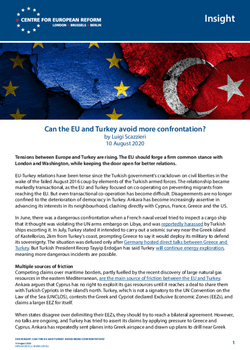
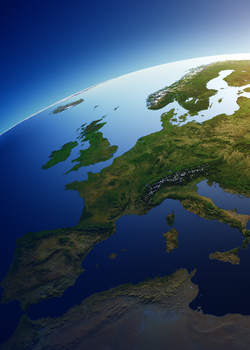
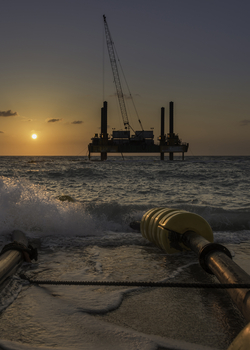
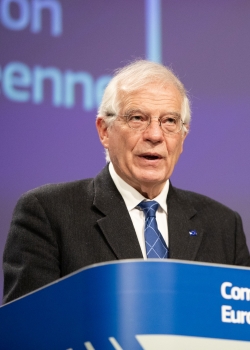
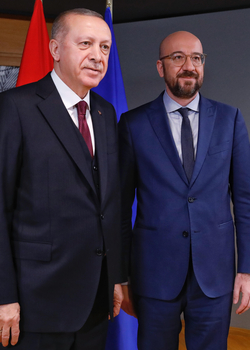
Add new comment